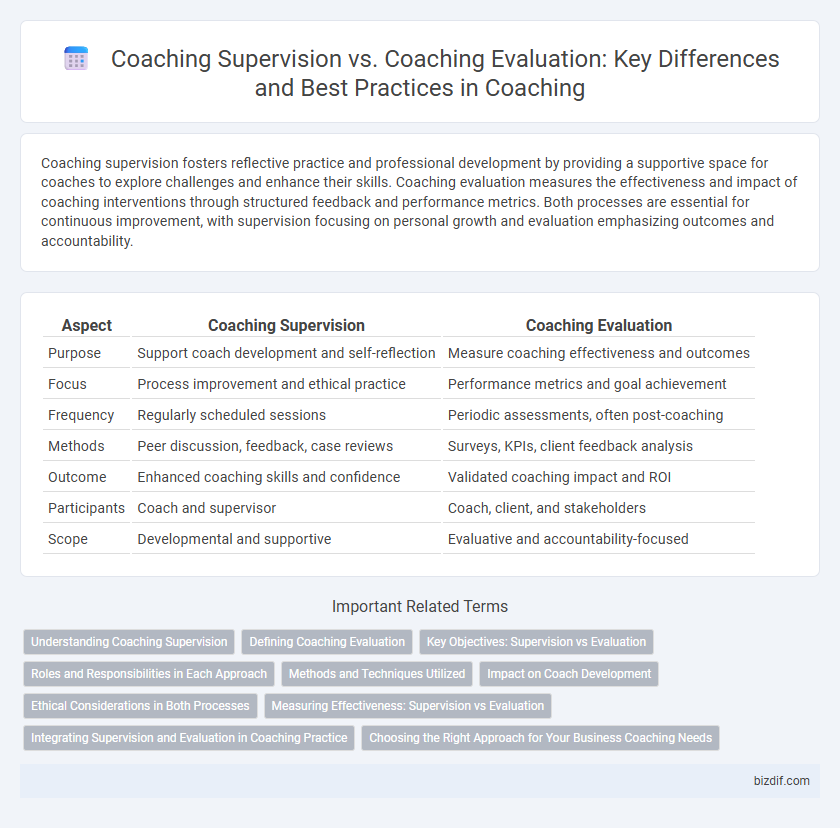Coaching supervision fosters reflective practice and professional development by providing a supportive space for coaches to explore challenges and enhance their skills. Coaching evaluation measures the effectiveness and impact of coaching interventions through structured feedback and performance metrics. Both processes are essential for continuous improvement, with supervision focusing on personal growth and evaluation emphasizing outcomes and accountability.
Table of Comparison
| Aspect | Coaching Supervision | Coaching Evaluation |
|---|---|---|
| Purpose | Support coach development and self-reflection | Measure coaching effectiveness and outcomes |
| Focus | Process improvement and ethical practice | Performance metrics and goal achievement |
| Frequency | Regularly scheduled sessions | Periodic assessments, often post-coaching |
| Methods | Peer discussion, feedback, case reviews | Surveys, KPIs, client feedback analysis |
| Outcome | Enhanced coaching skills and confidence | Validated coaching impact and ROI |
| Participants | Coach and supervisor | Coach, client, and stakeholders |
| Scope | Developmental and supportive | Evaluative and accountability-focused |
Understanding Coaching Supervision
Coaching supervision involves a reflective process where coaches receive guidance to enhance their professional practice, focusing on ethical standards, skill development, and personal growth. It emphasizes continuous learning and self-awareness through dialogue with a supervisor, creating a safe space for coaches to explore challenges and refine techniques. Unlike coaching evaluation, which measures performance against predefined criteria, coaching supervision prioritizes developmental support and professional accountability.
Defining Coaching Evaluation
Coaching Evaluation systematically measures the effectiveness and outcomes of coaching interventions using qualitative and quantitative metrics such as behavioral change, goal attainment, and return on investment. It involves predefined criteria and standardized tools to assess a coach's impact on individual and organizational performance. Coaching Evaluation differs from Coaching Supervision by focusing primarily on results and performance metrics rather than professional development and reflective practice.
Key Objectives: Supervision vs Evaluation
Coaching supervision aims to enhance the coach's professional development through reflective practice, ensuring ethical standards and continual skill improvement. Coaching evaluation focuses on measuring the effectiveness and outcomes of coaching interventions against predefined goals and performance metrics. The key objective of supervision is growth and quality assurance, whereas evaluation prioritizes accountability and impact assessment.
Roles and Responsibilities in Each Approach
Coaching supervision focuses on the professional development and reflective practice of the coach, where the supervisor guides the coach in exploring ethical dilemmas, enhancing skills, and managing client relationships. In contrast, coaching evaluation assesses the effectiveness and impact of coaching interventions on client outcomes, with evaluators responsible for measuring progress against predefined goals and providing objective feedback. Each approach demands distinct roles: supervisors act as mentors fostering growth and integrity, while evaluators function as analysts ensuring accountability and measurable results.
Methods and Techniques Utilized
Coaching supervision employs reflective methods such as peer discussions, video analysis, and feedback loops to enhance a coach's self-awareness and professional development. Coaching evaluation utilizes structured techniques including performance metrics, client feedback surveys, and competency assessments to measure coaching effectiveness and outcomes. Both approaches integrate qualitative and quantitative tools but differ in focus, with supervision prioritizing growth and evaluation emphasizing accountability.
Impact on Coach Development
Coaching supervision offers reflective support that enhances a coach's self-awareness and continuous professional growth by fostering critical thinking and ethical practice. Coaching evaluation focuses on assessing performance metrics and client outcomes, providing measurable feedback that guides targeted skill improvement. Both processes contribute uniquely to coach development, with supervision nurturing deeper professional insight and evaluation driving tangible competency enhancement.
Ethical Considerations in Both Processes
Coaching supervision emphasizes ethical reflection to ensure coach competency and client welfare, fostering accountability through ongoing support and development. Coaching evaluation involves measuring coaching effectiveness with ethical vigilance to maintain confidentiality, informed consent, and unbiased feedback. Both processes require adherence to professional codes of conduct and prioritization of client rights to uphold integrity in coaching relationships.
Measuring Effectiveness: Supervision vs Evaluation
Coaching supervision emphasizes ongoing reflective practice, offering coaches continuous feedback to enhance skills and ethical standards, which fosters deeper professional growth. In contrast, coaching evaluation focuses on measuring specific outcomes and performance metrics to determine the effectiveness of coaching interventions based on predefined goals. While supervision supports developmental learning processes, evaluation provides quantifiable data assessing the impact of coaching on client results and organizational objectives.
Integrating Supervision and Evaluation in Coaching Practice
Integrating coaching supervision and coaching evaluation enhances the overall effectiveness of coaching practice by combining reflective feedback with performance assessment. Coaching supervision fosters professional development and ethical standards through ongoing support, while coaching evaluation measures results against predefined goals and competencies. This integrated approach ensures continuous improvement, accountability, and alignment with client outcomes.
Choosing the Right Approach for Your Business Coaching Needs
Coaching supervision provides ongoing reflective support, emphasizing professional development, ethical practice, and accountability for coaches, making it ideal for long-term growth. Coaching evaluation measures specific outcomes and effectiveness through feedback and metrics, focusing on assessing progress and impact for targeted improvements. Selecting between supervision and evaluation depends on whether your business coaching needs prioritize continuous coach development or performance assessment.
Coaching Supervision vs Coaching Evaluation Infographic

 bizdif.com
bizdif.com